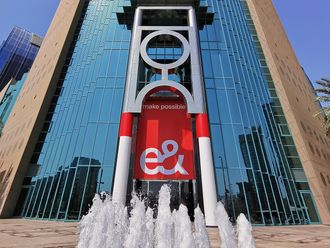London: US stocks fell, with the S&P 500 slipping from a 10-month high, amid speculation equities may have run too far too fast given the lacklustre prospects for global growth.
Banks led the early decline as Treasury yields sank to the lowest since February, denting optimism for a rebound in lenders’ profits. Wells Fargo & Co. and Bank of America Corp. slid more than 1.9 per cent. Raw-material companies snapped a six-day winning streak, the longest since October, with Freeport-McMoRan Inc. and Alcoa Inc. falling at least 3.1 per cent.
The S&P 500 retreated 0.5 per cent to 2,109.58 at 10:40am in New York, after climbing yesterday to within 0.6 per cent of a record. The Dow Jones Industrial Average lost 72.49 points, or 0.4 per cent, to 17,932.56. The Nasdaq Composite Index also sank 0.4 per cent. Trading volume in S&P 500 shares was about 9 per cent below the 30-day average for this time of day.
“With the market being priced where it’s at, there’s not a lot of room for air because valuations are so high,” said Jim Davis, regional investment manager at the Private Client Reserve of US Bank, which oversees $128 billion. “I would not be surprised to see it back off a little more in the next week. The market has to navigate some choppy waters between now and mid-July, with the Fed next week and the Brexit vote the following.”
Crude oil dropped for the first time in four days and a Bloomberg index of commodity prices halted the longest rally since March as the dollar bounced from a one-month low. Raw-material and energy shares have paced equity gains this week amid the currency’s post-payrolls sell-off, and the two groups have been pillars in a rebound that’s lifted the S&P 500 nearly 16 per cent from an almost two-year low in February.
Optimism that low rates and modest growth are a perfect recipe for stock gains has cooled before of a series of events that could set the tone in financial markets. The looming Federal Reserve meeting, followed by the Brexit vote and US political conventions have the potential to roil markets, and with stocks at multimonth highs, there’s diminished incentive to push prices higher.
Word that billionaire investor George Soros recently oversaw a series of big, bearish investments is also contributing to the tempered mood. A person familiar with the matter said Soros has become more involved in trading at his family office, concerned about the outlook for the global economy and the risk that large market shifts may be at hand.
A stock rally picked up pace in the past few weeks after losing momentum following a four-month high on April 20. The S&P 500 rose Wednesday for a third day, the longest winning streak in a month, and climbed in eight of the past 11 sessions. Still, the index has struggled to hold onto gains beyond the 2,100 level in prior rallies during the past year.
The benchmark has failed to move more than 0.5 per cent up or down for nine consecutive sessions, the longest such streak since September 2014. That’s come amid lighter-than-average volume. Through Wednesday, the period of tepid gains and declines saw daily trading average 6.6 billion shares, 11 per cent lower than the one-year average and almost 30 per cent below the average during a six-week rout that started the year.
While equities fell last Friday after a disappointing jobs report, support this week has come from Federal Reserve Chair Janet Yellen’s remarks that the US economy is making progress and indications that policymakers won’t rush to raise interest rates. Traders have cut back their bets for a Fed rate increase, now pricing in no chance of a boost in June. December is the first month with at least even odds of a rate increase.
Bolstering Yellen’s belief that the economy will continue to improve, a report today showed first-time jobless claims unexpectedly fell last week and the number of Americans already receiving benefits tumbled to an almost 16-year low, consistent with a healthy labour market.
“The S&P 500 has had a remarkably steady run over the last three weeks in particular,” said Michael Ingram, a market strategist at BGC Partners in London. “Still, the global economy is not in good shape. And while the last payroll report may be dismissed as an aberration, confidence in the US recovery has clearly been shaken.”












